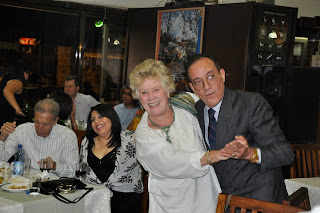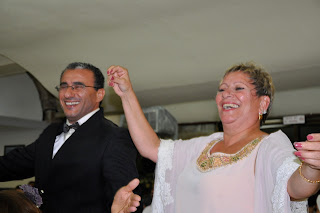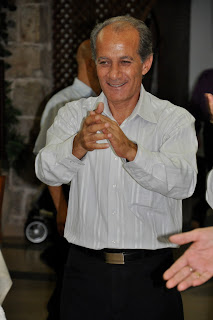 |
| Khitam's nephew Inas, brother Khalid, sisters Amira & Zada |
 |
| Umar & Nasra |
 |
| Khitam & Ahmad |
Khitam and Ahmad at their party taught me how much energy and joy there is in these warm wonderful people, Khitam, Ahmad and their Palestinian family and friends. The celebration of their marriage was a party like I can't remember. The warmth of the applause and hugs and smiles when they entered the room. Nothing was choreographed. People just knew and felt! And Khitam's and Ahmad's smiles gave back, returned the warmth. The applause and hugs lasted ten or fifteen minutes and then the dancing began and went on and on before, during and after eating traditional and delicious food: hummus, baba ghanouj, tabouli, other salads, fresh shrimp, fresh whole fish caught locally, chicken, Arabic sweets and more. I was included in this festival of family and celebration as a part of the family and know now that I am and had better behave when I return! I'd also better improve my Arabic.
 |
| The wall...or is it a prison... |
 |
| Sami & Duha |
 |
| Toujan & family |
I remember reading in T. E. Lawrence's SEVEN PILLERS OF WISDOM; Auda's "hospitality was sweeping; except to very hungry souls, inconvenient." He was referring to Auda abu Tayi, the great warrior of the Howeitats in the Jordanian desert, during World War I; he could have been referring to my hosts on this trip.
If you need anything, anything at all, just ask, if you dare. Your host will find a way of getting you what you need, even if it means going way out of his or her way. Don't be surprised at the response to your "thank you." "For what?" You try to explain how much you appreciate the trouble your host went to for you. "Trouble?" he or she will ask with a shrub. "It was no trouble. Please." Of course your host got you what you needed. Of course. "Mush miskalee": no problem.
I look forward to seeing many of these people again in Palestine. I hope also to host some of them here in Maine. Several have lived, studied and worked in the States.
 |
| A friend of Ahmad's "sits in" on the oud |
 |
| Khitam's niece Suraya & her husband, Ali |
 |
| Iman ululating at the party |
phone to congrat-
ulate them with words and by ululating.
I will remember the young IDF (Israeli Defense Force) soldiers at the check points who show no emotion and control the coming and going of Palestinians, most of whom are older than they and have lived in Palestine longer than they have been alive. Only a handful of them showed any emotion as we passed through the check points. I wonder if that helps them avoid considering the humanity of the people they are controlling. We were only stopped once by soldiers at a check point where Khitam had never been stopped before. There were four of us in the car: three Americans and Khitam, who is probably often taken for an Israeli because she is fair skinned. A young woman stopped us with a small gesture, took our passports, asked a few questions, then took our passports. We sat there for twenty minutes, no explanation, then a young man in the IDF returned the passports with no explanation. "Have a nice night," he said. We drove off and no one said anything until we got to our destination. Palestinians are subject to this and much worse every day, never knowing when they will be stopped or for how long. Ours was a simple delay and it was still unpleasant, as much for what it meant as for the inconvenience.
The Dead Sea: floating on it, watch others in the water, including several conservative Muslim women in head scarf and neck to ankles clothes. Men, including the rotund Russian immigrants, covered in greenish mud. The heat and the salt, the sting when a little gets in your eyes and the relief when you rinse it in the cool running fresh water from a spring.
 |
| Mazhnoon bushes in Jericho |
Yousef Awad's work with youth in Jenin: he raises money and organizes workshops in arts for young people: music, theater, drawing and painting, writing. He also sets up workshops for adults in community organizing. He and his wife and kids live together in a village not far from Jenin. For too long, after the wall was built, his wife lived on the other side of the wall. Recently, they have been able to reunite, though his wife's moving to "this side of the wall" is likely to result in her losing her Israeli citizenship. Before the wall, this was not an issue.
I will remember the settlements that have multiplied beyond anything I could have imagined before visiting. Former President Sharon said they would forever alter the face of the land and make a unified Palestine pretty much impossible. That is what is happening. That is why many Palestinians are deciding one country instead of two is the only solution, unless, as often demanded, Israelis pull out of many of the settlements and trade the space of settlements that are allowed to remain in the West Bank area for other land. If there is a two state solution anytime soon that retains all the settlements, there will be no tenable Palestinian state.
 |
| The Wailing Wall and Dome of the Rock |
I have a lot to learn about posting and a lot to learn about Palestine and Israel.








































